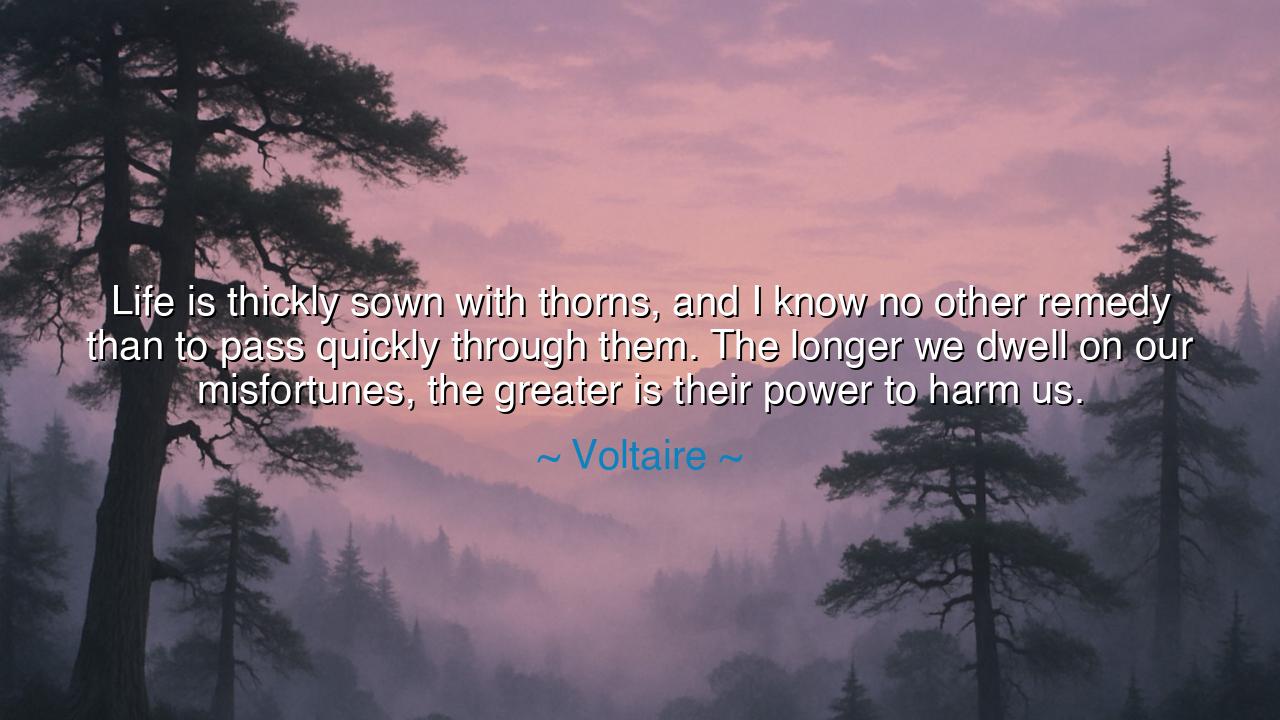
Life is thickly sown with thorns, and I know no other remedy
Life is thickly sown with thorns, and I know no other remedy than to pass quickly through them. The longer we dwell on our misfortunes, the greater is their power to harm us.






Voltaire, that restless spirit of the Enlightenment, speaks here as one who has tasted deeply of the bitterness of existence. He declares that life is thickly sown with thorns, and no man escapes their sting. But he offers a remedy: not to linger in sorrow, nor to cradle our wounds as if they were treasures, but to pass quickly through them. For misfortune grows in power when we kneel before it; the more we dwell upon our suffering, the more it roots itself in the heart and poisons the soul.
This is no idle speculation. Voltaire himself, persecuted for his sharp tongue, imprisoned in the Bastille, and driven into exile, knew well the sting of fortune’s cruelty. Yet rather than wither in despair, he pressed on, transforming pain into wit, and exile into freedom. His remedy was not escape from trial, but swiftness of spirit: a refusal to let misfortune rule longer than the moment required. Thus he turned the thorns of life into sparks of brilliance, and his voice still echoes through the centuries.
The ancients knew this wisdom also. When Aeneas fled the smoking ruins of Troy, he did not tarry to weep long over what was lost. He carried his father upon his shoulders and pressed onward, for destiny lay beyond the ashes. Had he lingered too long in mourning, Rome would never have been born. So it is with all men: those who fix their gaze too long upon their losses are bound in chains, while those who move swiftly through pain may yet find greatness on the other side.
Consider too the life of Abraham Lincoln, who endured repeated failures in politics, crushing grief in the loss of his children, and the torment of leading a nation through civil war. Yet he did not allow despair to devour him. He bore the wounds swiftly, pressed forward, and turned sorrow into resolve. Had he surrendered to his misfortunes, the Union might have perished; instead, he endured the thorns and led a people into renewal.
Let this truth be handed down: when pain pierces the heart, do not give it dominion by brooding long upon it. Thorns are sharp, but they cannot chain the soul that refuses to halt among them. Pass through swiftly, as one walking barefoot across fire, and you shall find that even the fiercest flame loses its power when the spirit refuses to linger. For the strength of man is not in avoiding sorrow, but in mastering it by speed, courage, and unyielding forward motion.






NHBui Ngoc Huy
This quote resonates with the concept of resilience, emphasizing action over stagnation in the face of misfortune. However, it also makes me question whether this approach could lead to emotional suppression. Is there a risk that moving too quickly through hardships might prevent us from fully understanding ourselves or developing empathy? It seems that the challenge is to endure and learn without letting the thorn’s power dominate our lives.
AMcan anh minh
I’m struck by the paradox in Voltaire’s advice: acknowledging that life is painful while advocating for swift passage through difficulties. It raises a question about human nature—are we wired to dwell on suffering, and does this make it harder to move forward? Perhaps wisdom lies in learning how to process pain just enough to extract lessons, but not so much that it paralyzes us.
QATa quoc anh
This quote makes me think about the role of mindset in coping with adversity. Voltaire seems to argue that the way we handle misfortunes—speed of response and attitude—affects their impact. I wonder if this philosophy could be applied in modern mental health practices, like cognitive behavioral therapy, which encourages reframing and moving past harmful thoughts. Could adopting this perspective reduce the psychological weight of daily challenges?
NHNguyen nhu huong
What strikes me is the imagery of life being ‘sown with thorns.’ It conveys that challenges are inevitable, not accidental. Voltaire’s approach suggests that suffering only becomes more damaging the longer we fixate on it. I’d like to explore whether this philosophy applies equally to emotional and practical hardships, and how one might cultivate the strength to ‘pass quickly’ without suppressing natural emotions or insights that adversity can provide.
PVPhuc Van
I find this statement both pragmatic and a bit harsh. The idea of passing quickly through life’s thorns feels like a call for resilience and efficiency in handling suffering. Yet, I question whether rushing through challenges might lead to avoidance rather than resolution. How can one confront difficulties fully while also preventing them from growing in power over time? It seems like a delicate balance between engagement and detachment.